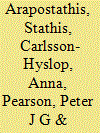| Srl | Item |
| 1 |
ID:
117232


|
|
|
|
|
| Publication |
2013.
|
| Summary/Abstract |
This paper describes initial analysis of branching points on a set of transition pathways to a UK low carbon electricity future by 2050. As described in other papers in this special issue, we are exploring and analysing a set of core transition pathways, based on alternative governance patterns in which the 'logics' of market actors, government actors and civil society actors, respectively dominate. This core pathway analysis is enhanced by analyses of branching points within and across the pathways, which informs how competition between different logics plays out at key decision points. Branching points are defined as key decision points at which choices made by actors, in response to internal or external stresses or triggers, determine whether and in what ways the pathway is followed. A set of initial branching points for our three core transition pathways is identified through project and stakeholder workshops, and drawing on analysis of actors' choices and responses at past branching points in energy system transitions. The potential responses of the actors are identified at these branching points, and risk mitigation strategies are formulated for the dominant actors to reinforce that pathway, as well as opportunities for actors to move away from the pathway.
|
|
|
|
|
|
|
|
|
|
|
|
|
|
|
|
| 2 |
ID:
117222


|
|
|
|
|
| Publication |
2013.
|
| Summary/Abstract |
The paper aims to inform historically the analyses of future sociotechnical transition pathways in the electricity sector, particularly those developed by the Transition Pathways to a Low Carbon Economy project. It also aims to inform the theoretical approach to transitions by focusing on key decisions at 'branching points' that led to transitions in the UK gas energy services regime, which occurred under different governance patterns. The first historical case study covers the market-led transformation of the manufactured gas regime from 1877 to 1914, which developed the end-uses of gas beyond lighting to include cooking, and extended access to working class consumers. The second case study covers the period from 1948 to 1977, historically reconstructing the transition from town gas to natural gas. This state-led and coordinated conversion to natural gas was preceded by a period of destabilisation of the manufactured gas regime, the co-existence of several niche technologies and the hybridisation of the key actors and technological infrastructures of the incumbent regime. Comparing the cases provides insights for future energy service transitions by addressing the significance of power, trust and networking in the decision making processes involved in the governance of energy transitions.
|
|
|
|
|
|
|
|
|
|
|
|
|
|
|
|